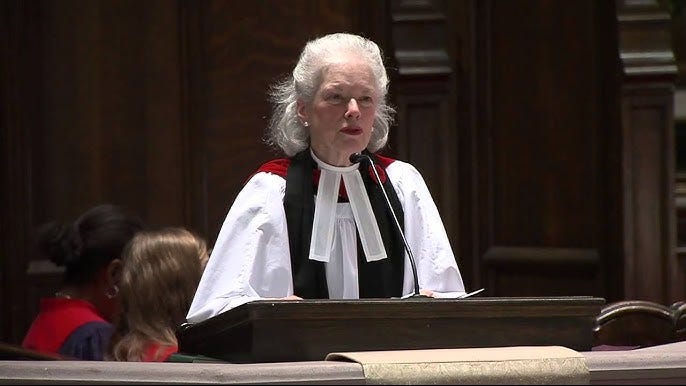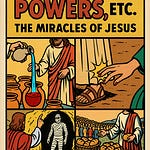“I feel sort of sorry for people who are mired in the world of did this really happen. I think it's a way of keeping the claims of scripture upon us at arm's length.”
Hello Friends,
For your Advent anticipation, here is a conversation I had about the season with Fleming Rutledge. The conversation is a couple of years old now, but Fleming’s wisdom is evergreen.
The transcript is copied below, but here is her prayer at the end:
Almighty God, creator of the universe:
Creator of the stars, sun, moon, planets, galaxies, infinite reaches that we cannot even conceive of.
Grant that we may be mindful of the way in which you came to Earth, emptying yourself, Lord Jesus, of all your glory, all your power, all your imperial reign... Your Majesty...leaving it all behind you, entering into our corrupted, polluted, tragic life, the life of Adam, fallen.
Let us remember this with awe and wonder, the awe and wonder of children, little children, and with the awe and wonder of the adult who has passed through the time of unbelief and skepticism and come out into the glorious wonder of your gospel truth.
Lord, in this time in our country, when truth and falsehood and fantasy and self-seeking and self-gratification...and heedlessness and anger, and sometimes real hate but also fear, a time in which fear seems to predominate among us. Lord, work a miracle for us this Christmas.
Let large numbers of Christian believers see what you have done for us, what you are doing in us and through us, and what you will do and you're coming again.
Please Lord, help the church to resist the fear, the lies, the BS. Help us to resist evil. Help us to resist intolerance. Help us to resist indifference. Please, Lord, call the international community to account for the Syrian refugees. Teach us what to do about helpless people who seek our shores. Help us not to be defeated and discouraged and weary and give up. Strengthen and confirm God and direct all those Christians around the world who are already serving in humility, in sacrifice, in dedication to those who are suffering in the most extreme way. And through them, Lord, glorify the name of our Lord Jesus Christ and call more of us, many, many more of us, to the service of this terribly suffering world.
Free us from fear, Lord. Keep us focused on the star ahead of us, the light, which is the word of God, in the beginning, the word made flesh, dwelling among us, full of grace and truth, in his precious and glorious name.
We pray. Amen.
Here is a rough transcription of the conversation as well:
When he asked me, did that really happen? I didn't know what to say and I don't think I said anything very helpful. I think it was a wash. But what I wish I had said, I guess is, I guess I wish I had bypassed the question, did this really happen? And said something like
Isn't this a wonderful story? Isn't it marvelous that God helps His servants when they are in despair? God will help you too when you're afraid and when you are in trouble. And Daniel prayed to God and God responded to him or something like that. Something that a child can understand in the case of children to start saying well what happens when prayers are not answered and what is the problem of suffering and what is the answer to the problem of evil and things like that children who are seven years old or not i think that you have to be eleven i think eleven is the age when children begin to think abstractly and people who understand the way that children's minds work always say do not try to explain the biblical stories to children so it's a fine line between explaining the story and allowing the story to speak.
But you see what I'm getting at, I think. There are many stories in the Bible where we do tend to ask, did that really happen? And that brings us into the realm of the discussion about fact.
And I personally, I feel as if I operate in two different worlds at once. And I think that a lot of people do. What do you mean by that? Well, I'm going to try to explain. I come from a family of historians. And my mother and father were passionate about factual truth and research and tracking down events on historical people and my parents were really very bent on that and would correct us if we said something that was short of being exact and so I have an enormous perhaps overdone respect for fact but at the same time i come from a literary family in which fairy stories and poetry and drama and novels and fiction in other words played a huge role and i think that's the best way to be to have both of these going on at one time to be a poet and a historian at the same time uh...truly who excuse me people who are purely interested in history tend to lack the imaginative dimension that produces great literature even the very best books of history and i've read some of them and love them but even the very best ones cannot do what the writer of fiction can do they cannot show you the person's inner life. They don't have any access to the person's inner life, no matter how good the biography is. It's always something that's going to be hidden from the biographer. So people that spend their whole lives, as many men particularly do, reading history and biography, they're going to miss something. They're going to miss that extra dimension that fiction and poetry can give you. And so I think that we need in our training of preachers and our training of um... clergy and our training of lay leaders, teachers we need to cultivate this ability to think in terms of fact and in terms of imagination simultaneously or at least alongside one another so that you can shift back and forth stopping to think. But that does, I think, require a kind of immersion in reading various types of writing. And so the whole idea of genre is very important. I never was very interested in that, but I can see now how important it is if you know that the book of Jonah is the genre of fable, if that's correct, then you read it somewhat differently than you would if you were reading it as a story that is literally factual. If you read the story of Jonah as literally factual, you're going to miss the point. And you're going to mispreach the point too, I think. What? I think you...
It's not just reading it, it's the preaching of it too. I get skewed. The preaching of it, yes, exactly. When I preach stories that have been questioned, biblical stories that have been questioned. I've suspend the question. I've often told the story about how when I was a much younger preacher, just getting started really, and I was preaching in Richmond, Virginia, which was where a huge congregation of my former classmates, my husband's former classmates, my cousins, my mother...people from my hometown. There's just dozens, if not scores, of people who I knew and had a connection with. And my mother was sitting, but also there were lots of people who were just members of the congregation, didn't know who I was. And my mother was sitting out there in the congregation, and I preached on something like maybe the raising of the daughter of Jairus, Jesus' miracle.
And my mother heard somebody say, she preached that as if she believed it. And I've often remembered that because I committed myself afresh when I heard that, to preaching as if I believed it.
I think that is what preachers should do.
And just set aside the question of did this really happen.
You can believe that Jesus Christ raises the dead and proclaim it the way the New Testament proclaims it by telling stories about how he raised the dead without getting off on this parallel track of did it really happen. I feel sort of sorry for people who are mired in the world of did this really happen. I think it's a way of keeping the claims of scripture upon us at arm's length. Oh, without a...and but not necessarily intentionally. A lot of people just have literal minds. They think literally mindedly and it's not their fault. I think it's a loss, but it's definitely not a defect in their personality or anything like that. They probably just didn't have a whole lot of poetry in their childhood. But also there's something somewhat there's something ineffable about it. We don't know why some people in one sibling will be poetic and the other one will be prosaic, and we don't know why that is. They both had the same parents. But anyway, now getting to the situation that we find ourselves in now politically.
Here's where the historian mentality, I think, has to come into play. Because if someone is just recklessly inventing so-called facts, partly because to do so attracts attention and gains adherence and ramps up the level of commitment to whatever the program is that's being extolled or whether it is simply lying is an important question. A lot of people are referring to the book called About BS, which is taking on a new life. I think it was published about 20 years ago and now it's being referred to constantly.
And for the benefit of your readers, I mean your listeners, you see how literary I am. Your listeners.
The definition put forth by the author of B.S. I can't remember what his name is. He's a professor of something or other. And he makes this distinction. A person who tells a lie knows what the truth is, even as he or she tells the lie. But BS has no relationship to the truth at all. That's a good distinction. And that's what we're seeing here, I think, today. It doesn't really matter to people who are speaking in the public forum, whether it be on Facebook or on Twitter or...into a microphone in front of a live audience, there's this sense that if it's entertaining and if it's arousing and if it somehow moves your gut, it doesn't really matter whether it's true or not. And people are not asking, is it true? They're just responding to it. That's BS.
An outright lie can be tracked to its source and proven to be a lie. But BS is, it doesn't really matter in a lot of cases, whether it's true or not, the point is being made somehow. If it is believed by large numbers of people that thousands of Muslims were dancing on the rooftops in New Jersey on 9-11, is that a legend that's become fact or a fact that's become legend, or is it important to keep saying that never happened, that never happened?
I think it is very important to keep saying it, but we have to realize that there are going to be millions of people who are always going to believe that it was true.
And what does all this mean for preachers? It's a delicate matter, as I've tried to show in some of my prior illustrations. I do not believe that preachers should be in the business of lying. And I certainly don't think preachers should be in the business of BS. Many are, though. Which would be worse but i do think we need to think deeply about how we present the biblical material above all we need to be completely grounded in the historical fact of Jesus' crucifixion. If anything in the Christian story is a historical fact, it is that he was crucified under Pontius Pilate. And somehow that anchors, well not just somehow, it does. It anchors the story in historical particularity.
And we've all heard the phrase, the scandal of particularity, and that's at the center of the Christian proclamation, the scandal of particularity. That the eternal Godhead became incarnate in the person of Jesus of Nazareth in a specific place, at a specific date in history publicly executed by the Romans outside of the walls of Jerusalem in an identifiable year.
That's fact. Even the skeptics, most of them at least, admit that that's the fact. Now there are some people who think it's a fact that Jesus never existed at all. I think that's preposterous.
So we're in a complex discussion here. Once we've anchored Jesus of Nazareth in his specific place and time under the specific Roman procurator, then what do we say?
What do we say about the resurrection?
Well, here again, we're in the…and I'm not going to call it a gray area. I do not think it's a gray area. I think there is light in the story that can be seen from several different angles. The angle of fact and the angle of trans-historical occurrence. I guess that's what I would call the resurrection event. The crucifixion was a historical event. I don't think that the resurrection can be anchored in history in the same way that the crucifixion can, because the resurrection was seen only by those who believed.
And that in itself was the work of God. God is the protagonist all the way through. God is the one who chose who would see the risen Christ, because Paul, Saul, Saul was not only an unbeliever, he was a fanatical unbeliever as we know, and yet God chose to turn him around. It was God who did that so that he became a believer who saw and heard the voice of the risen Christ. It was a trans-historical, transcendent event but much of Jesus' ministry does read as history in certain ways. And yet if you read the New Testament as though it's history, then you're gonna miss the whole thing.
If you read the story of Jesus walking on the water, say, and you are consumed by the question, did this happen or did this not happen? You'll never understand what the story is telling us. And yet, having said all that, I still have to come back to the importance of factual truth in the public square. And I do think that every human being
Every human being can understand what it would mean to be unjustly, unfairly and untruthfully accused of something. I can't imagine any human being who would not protest, but that's not true. That didn't happen. That's not the way it was. And that's what the courtroom is focused on with the opposing lawyers trying to establish what the truth is. I do think people can relate to that, even if they are willing to listen to all kinds of BS from the rostrum. People do have an underlying sense that certain things did or did not happen.
The problem then becomes, all right, so Fleming Rutledge was hit by a taxi on 4th Avenue and 10th Street in New York City in 1986. The witnesses, some witnesses said I was walking west to east, and other witnesses said I was walking east to west.
They all agreed I'd been hit by a tax.
So, witnesses are notoriously undependable, and I myself have learned that my memories of certain things are erroneous, which has been quite a shock to me. I have quoted things that were never said, and I thought they had been said, but apparently they never had been said. So, this is a murky discussion.
But at the same time, every Christian believer is committed to the statement of Jesus that He is the truth. He is the truth. And when all is said and done, at the end of the age, everything false will be swept away as though it had never been. And only the truth in Him will remain.
And so I think it's part of our obligation as preachers and teachers of the faith to continue to hold to our conviction given us by God that Jesus and the story of Jesus and the promise of Jesus is the truth.
Speaking of the end of the age, I'm wondering how would you connect what you're saying with the season of Advent? It's funny that you asked that because I was just thinking that was the next thing I wanted to mention. I mean, is, because the not yet-ness of God's world is part of the Advent season and is one of the ways we anticipate Christ coming again is by...calling BS as BS in the world and insisting upon the truth? Oh, I think so, absolutely. I think it's one of the most important things. It's a way, it's a form of resistance. Hmm, hmm, better word. And that word is increasingly more important to me and it's associated so much with Dietrich Bonhoeffer. But there have been so many resists in the history of Christianity and...not enough, not enough resistors, but...
Wherever the word of God is truly preached, that is resistance in itself. William Strangfell talked about that all the time. The word that demolishes all untruth and exposes all pretence and brings down all false powers, the word of God. But as far as Advent is concerned, I've been sort of playing around with the idea that whereas Advent is usually described as the in-between time of waiting and the time of hope, and that's right, that's absolutely right, but I think more and more today, I think more and more of Advent in terms of promise and the one who promises.
So many promises are worthless. People promise things all the time and break it the next day or the next week or the next decade. Think of all the broken promises, good Lord. So to know the one who promises is the truth and that the one who promises is God in three persons, the creator of the universe and the one who will come to be our judge and that the promise of the judge is that those who put their faith in him will be vindicated.
That promise is what really lies, I think, at the center of the entire Christian life. And I don't know that we hear enough about that. I have often urged preaching students or people who ask me about preaching, always make sure that your sermon contains a promise not an exhortation but a promise. That would transform a lot of preaching. Yeah. But it has to be God's promise and not some kind of human promise. So if you were preaching this Christmas Eve.
What would you preach from it?
Well, actually, I'm not going to preach on Christmas Eve, but I am going to preach on the 21st of December. Okay. I'm going up to Cooperstown, New York, which is one of the most beautiful towns in the United States, and it has the Baseball Hall of Fame, and it has the renowned Glimmerglass Opera Company, and it has the whole James Fenimore Cooper legacy, and one of the most beautiful lakes in the United States. It's an absolutely exquisite little town, but it's in the middle of nowhere.
And so there we're going to be on December 21st, the winter solstice, the shortest night of the year, the darkest night of the year, the feast of St. Thomas the Apostle and I'm preaching the sermon for the institution of the new rector of Christ Episcopal Church in Cooperstown. Now, I don't want to give away too much, but I'm going to wind up, I think, with the promise that God made, that Jesus made to Thomas. Do you believe me, Thomas, because you have seen?
Blessed are those who have not seen and still believe and the evangelist goes on. These, Jesus did many things that are not written in this book, but these are written in order that you may believe in Jesus Christ our Lord. That's not quite it. It's a little bit different from that. I'm not good at memorizing. That part of John has always driven me crazy, the idea that there's things left out. Such a tease. Oh, really? That's interesting. I don't give a second thought to that. I know I'll know it someday. We know what we need to know. I won't be able to quote that properly. Just give me a minute to look it up.
The whole idea of the darkest and longest night of the year, that was an inspired choice, I think, for Christmas to come at that time. And...
The fact that it coincides this year with the feast of Thomas, it really gives me an opening, I think. Let me read that verse, the way it's supposed to be read.
This is the end of chapter 20, which is the original ending of the gospel. Many other signs truly did Jesus in the presence of his disciples, which are not written in this book. But these are written, that you might believe that Jesus is the Christ, the Son of God, and that believing you might have life in his name. That's what I should have said.
That's the promise. The promise is that belief in Jesus means life in His name, eternal life in His name, with all that goes with that. And it's all...
it worked out by God that we should believe through hearing the word. And that the proclamation of the word generation after generation would bring new believers into birth. I don't think most preachers in the main lines anyway have any idea that that's what they're doing. No, and it calls attention to your point that I mean if life in His name is mediated by the word, proclaiming the word truthfully without lies or BS is essential for salvation.
Yes.
But a lot of preachers that I hear, and I do travel around the church a great deal, there is a confidence lacking, passion is lacking. It's as if the preacher is backing away from the very power of what the text says and the way the text says it. It's as if we're afraid of our own scripture.
Yeah, it's... We're part of the power of our own scripture. I think a lot of us give talks rather than preach or proclaim.
Exactly, exactly. I don't want to sound overly critical because I don't think preaching is taught very well in most locations. I was just really, really blessed because the combination of my homiletics professor Edmund Stymely, the great Lutheran preacher, the combination of Stymely and me was one of those things. We never became friends unlike all of my other favorite professors who became friends. I never knew Edmund Steinway as a person at all, but he had, he's the person who made the difference between my being an ordinary, mediocre preacher and a really important preacher. He's the one that made the difference. And he talked to us about the importance of the, oh, we didn't talk about narrative. He always talked about story, he didn't talk about narrative. Now we talk about narrative all the time. But the
But the sermon should be a narrative. It should be a narrative of God's, as Barth says, the journey of the Son of God into the far country. It's a narrative. The word narrative is taken on all sorts of negative connotations in some circles, because a lot of good Christian teachers still think in the way of the modernist era, where reason and rationality range supreme and a lot of people still think that way. Although we've long since moved out of that in general, where narrative has become the controlling notion. And so the people who think in terms of rationality and provable reality and so forth are very suspicious of narrative because your narrative is yours and my narrative is mine and there's no place to anchor anything. Whatever works for you is the idea that so many evangelical preachers are fighting against. Rightfully so, I'm fighting against it too, but I want to fight against it in a different way, not by recalling people to exactly except the fact of jesus and his crucifixion but and certainly not calling people back to rational facts as though the christian faith could be proved that way that's where i part a little bit i know that ccs louis uh... the mere christianity is book uh... that's a very modernist book i think and I don't particularly resonate to it anymore, I used to, but I don't now. I like his space trilogy best. I do too. That's where I think he's really taken wing. But Me of Christianity continues to convert people. It does, yeah. College students in particular. What kind of students? College students, I think, resonate with it a lot. Uh-huh. Well, more power to him. But I do think some of the arguments sound quite dated
I'd rather they read them the Narnias and the Space Trilogy. I even like the last volume in the Space Trilogy, which is generally disdained, but I have a little group of friends that we all agree that one is just terrific. Do you know that one? Yeah, I read them, I think I read them in high school. Right, when I first became a Christian I read all of
I think that the space trilogy stands up really well. It's got the middle one, what is it, Paralindra. Paralindra is the best definition of predestination that I have ever read. I quote it all the time. Well, Fleming, I think this is good. I think this is very good and helpful for me as I think about closing out Advent and Christmas in particular some sort of advent encompassing prayer? I'll try. I'm beginning to feel very much called to my metal about this praying because I don't think of myself as a very good prayer at all. Certainly a very irregular prayer and a very slothful prayer, but since you say that people like to hear the prayers, I'll try.
Thank you.
Let us pray.
Almighty God.
creator of the universe.
Creator of the stars, sun, moon, planets, galaxies.
infinite reaches that we cannot even conceive of.
Grant that we may be mindful of the way in which you came to Earth.
Emptying yourself, Lord Jesus, of all your glory, all your power, all your imperial
Reign... Your Majesty...
leaving it all behind you.
entering into our corrupted, polluted, tragic life, the life of Adam, fallen.
Let us remember this with awe and wonder, the awe and wonder of children, little children, and with the awe and wonder of the adult who has passed through the time of unbelief and skepticism and come out into the glorious.
wonder of your gospel truth.
Lord, in this time in our country, when truth and falsehood and fantasy and self-seeking and self-gratification...
and heedlessness.
and anger, and sometimes real hate.
but also fear, a time in which fear seems to predominate among us. Lord, work a miracle for us this Christmas. Let large numbers of Christian believers see what you have done for us, what you are doing in us and through us, and what you will do.
and you're coming again.
Please Lord, help the church to resist.
The fear, the lies, the BS.
Help us to resist evil. Help us to resist intolerance. Help us to resist indifference. Please, Lord, call the international community to account for the Syrian refugees. Teach us what to do about helpless people who seek our shores. Help us not to be defeated and discouraged and weary and give up.
strengthen and confirm God and direct all those Christians around the world who are already serving in humility, in sacrifice, in dedication to those who are.
suffering in the most extreme way. And through them, Lord, glorify the name of our Lord Jesus Christ and call more of us, many, many more of us, to the service of this terribly suffering world.
Free us from fear, Lord. Keep us focused on the star ahead of us.
the light, which is the word of God, in the beginning, the word made flesh, dwelling among us, full of grace and truth, in his precious and glorious name.
We pray. Amen.













